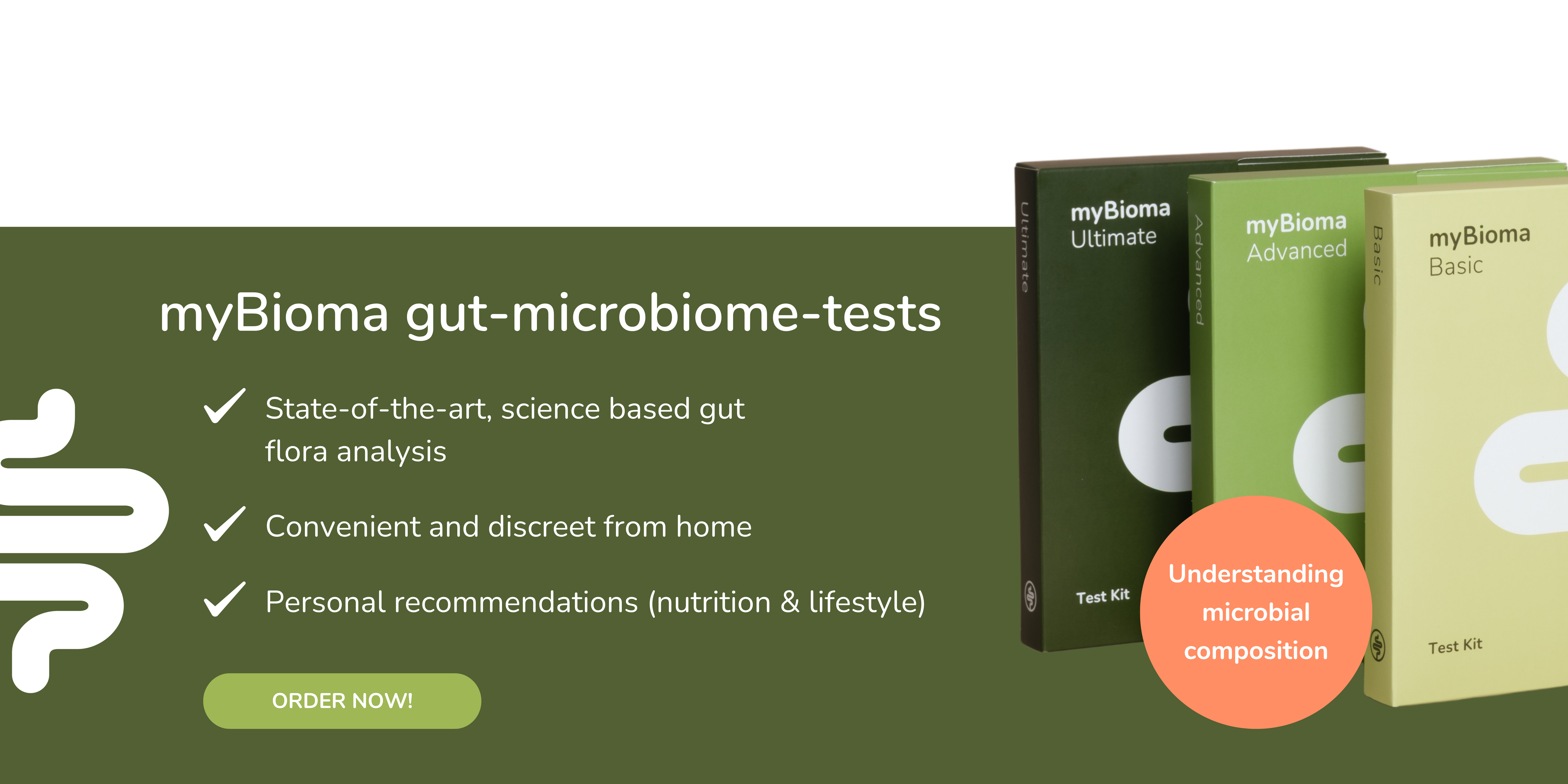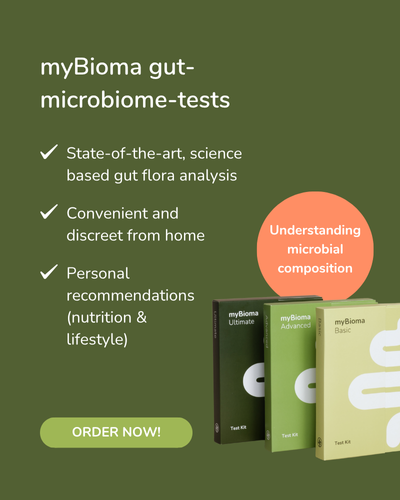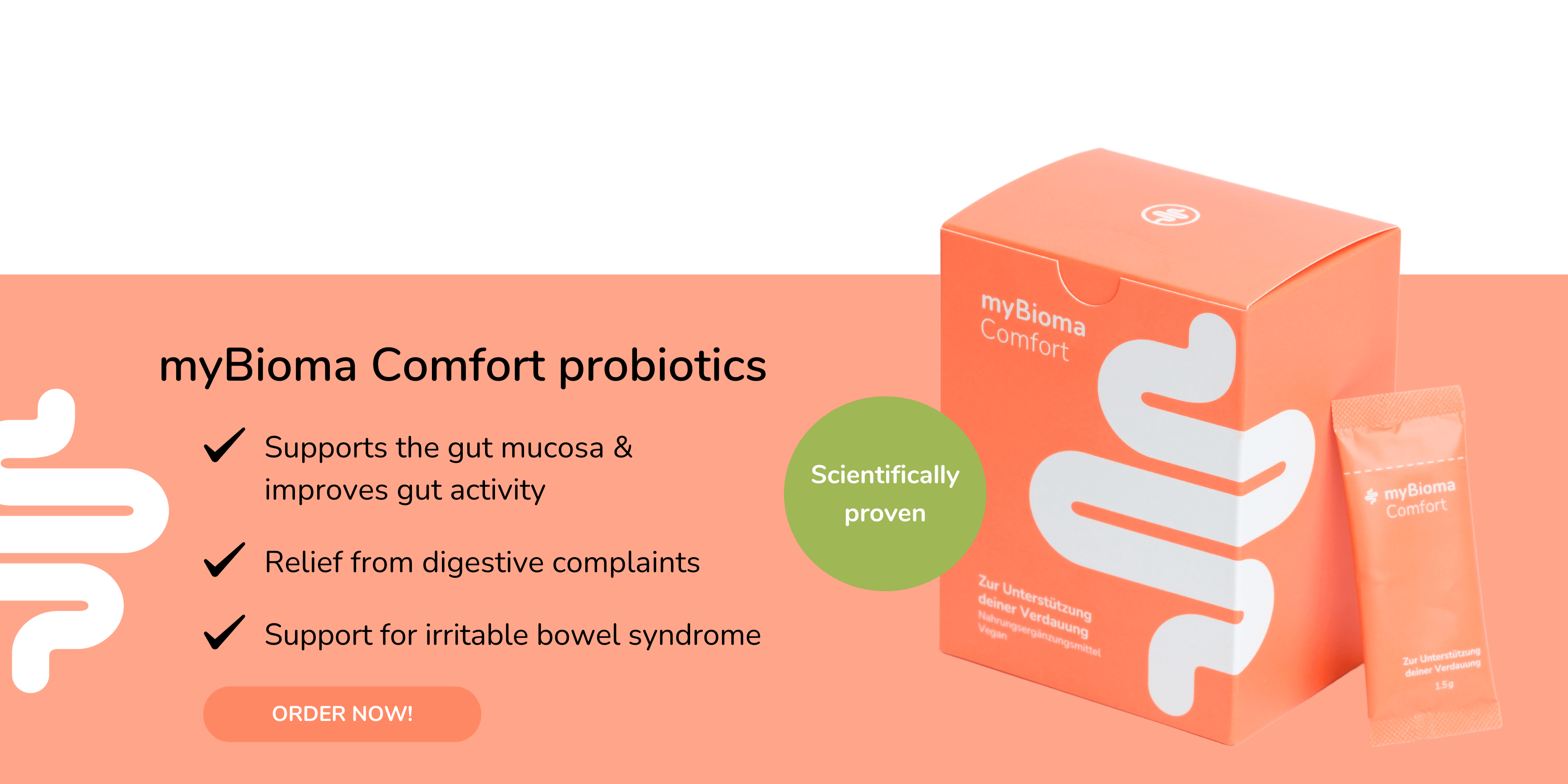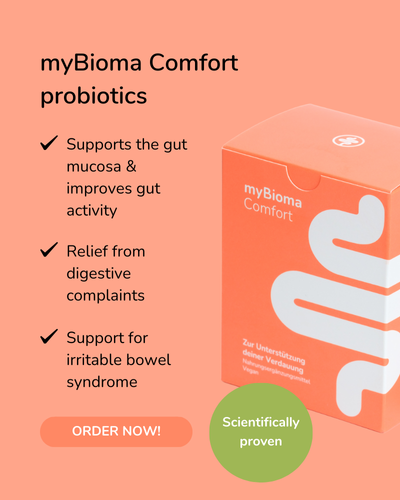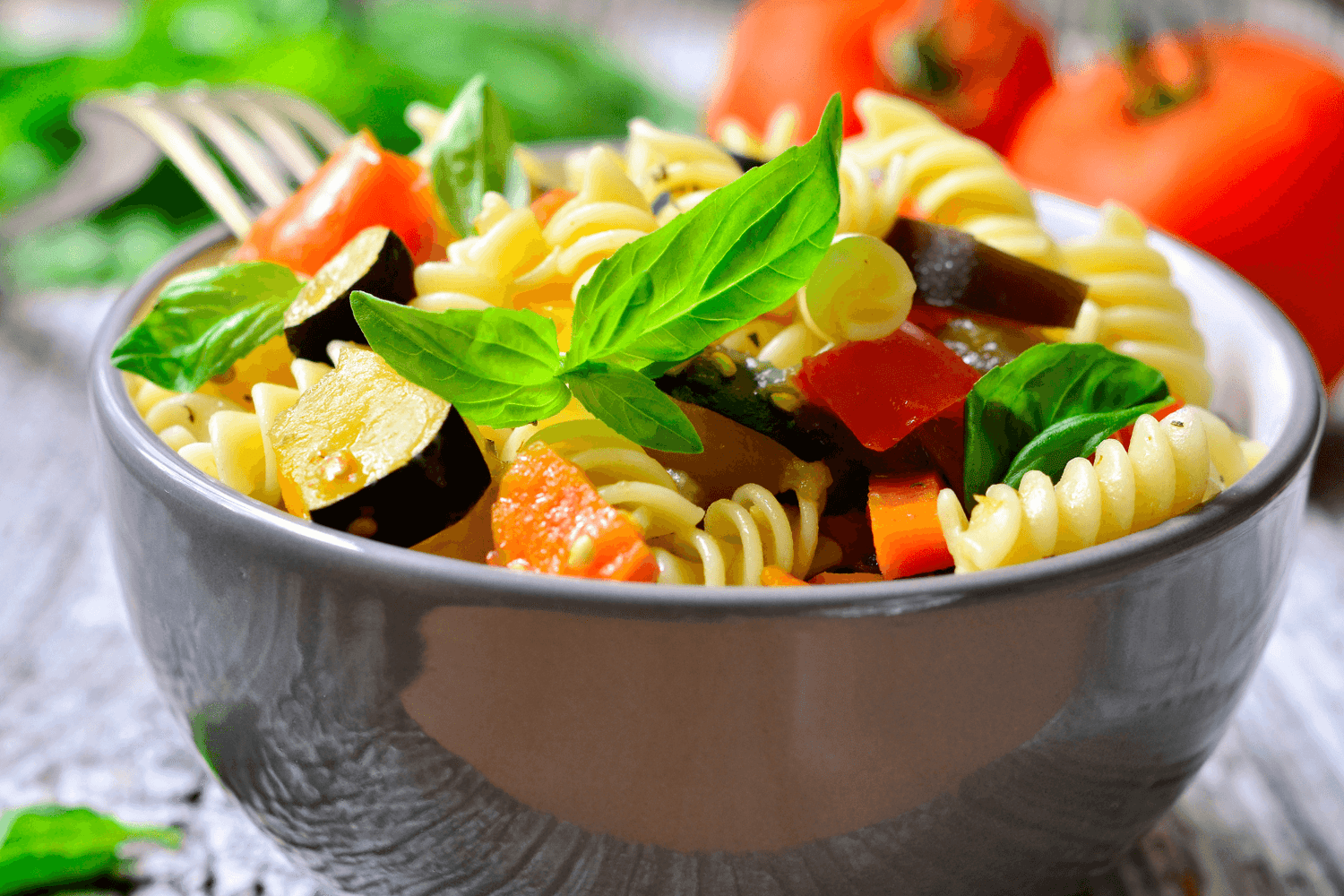Table of contents
- What is IBS?
- Symptoms of IBS
- How does irritable bowel syndrome develop?
- The connection between the gut flora and IBS
- If you suspect IBS, consult a doctor
- This helps with IBS: The best tips for constipation, diarrhea, stomach pain and flatulence
- Stress reduction and support of the gut-brain axis in IBS
- The right diet for IBS
- The Low-FODMAP diet for IBS
- Prebiotics and probiotics as treatments for IBS
Constant stomach pain, flatulence, diarrhea and constipation - if these symptoms persist for a long time and occur without any identifiable cause, irritable bowel syndrome (IBS) is often suspected. Digestive problems are a sensitive topic that many people are reluctant to talk about - but you can be sure that it affects more people around you than you might think. In this blog post, you'll learn about the factors that may contribute to the development of irritable bowel syndrome (IBS) and what you can do to relieve your symptoms and improve your well-being.
What is IBS?
Irritable bowel syndrome (IBS) is defined by the following criteria:
- Persistent digestive problems such as abdominal pain, bloating, diarrhea and/or constipation for more than three months.
- The symptoms occur frequently and intensely enough to interfere with daily life.
- No other underlying conditions can explain these symptoms.
In some cases, IBS may resolve on its own over time, but many people experience long-term symptoms. The exact prevalence of IBS is unclear, but it is estimated that 10-15% of the global population is affected - women more frequently than men. This makes IBS one of the most common gastrointestinal disorders in in countries with a western lifestyle (1,2).
Symptoms of IBS
IBS symptoms vary in severity and can be categorised into different types based on the predominant symptom:
- Diarrhea type: Loose, or watery stools multiple times a day.
- Constipation type: Less than three bowel movements per week, hard, lumpy stools, uncomfortable, and difficulty passing stool.
- Mixed type: Alternating episodes of diarrhoea and constipation, sometimes even within the same day.
In addition, bloating, flatulence and abdominal pain are common in all IBS subtypes (1,2).
How does irritable bowel syndrome develop?
The causes of IBS are complex and often difficult to pinpoint. However, experts widely agree that the condition is linked to dysfunction in the gut-brain axis—the communication network between the gut and the brain via nerves and chemical messengers like hormones. If you’d like to learn more about the gut-brain axis, check out this blog post: How the gut and brain are connected
This dysfunction can make the intestinal wall hypersensitive, causing people with IBS to perceive pain or normal digestive processes more intensely than healthy individuals. Additionally, psychological factors such as stress can worsen IBS symptoms or even trigger the condition.
Other factors that researchers have found in affected individuals include (1,2):
- Altered gut motility: The movement of food through the intestines is either too fast (leading to diarrhoea) or too slow (causing constipation). This can also contribute to bloating and abdominal discomfort.
- Impaired gut barrier function: The intestinal lining acts as a protective barrier. If it becomes too permeable (“leaky gut”), harmful substances may pass into the body, potentially triggering inflammation and increasing pain sensitivity in the gut.
- Disrupted bile acid metabolism: Too much or too little bile acid production, or improper absorption in the gut, can lead to digestive issues such as diarrhoea and abdominal pain.
- Dysregulated immune function in the gut: Over 70% of the immune system is located in the gut. Learn more about this in our blog post: How your gut microbiome strengthens your immune system
- Nervous system in permanent stress mode: The activation of the sympathetic nervous system (the so-called “fight or flight mode” of our nervous system) is increased, while the activity of the parasympathetic nervous system (the “rest and digest mode”) is reduced.
- Hormonal influences: Hormones are closely linked to gut function. Higher oestrogen levels have been associated with reduced gut motility and increased pain sensitivity, which may explain why IBS is more common in women of reproductive age. Learn more here: Women's health and intestinal health: connections explained.
- Genetic factors: Both genetic predisposition (genes inherited from parents) and epigenetic factors can play a role. The latter are changes in gene activity that are influenced by environmental factors such as traumatic experiences, psychological and physical stress, infections or nutrition.
- In addition, there are increasing reports of (recurrent)IBS following a gastrointestinal infection or the intake of antibiotics.
These potential causes and contributing factors have been identified in various studies and often interact with one another. However, not all of them are present or equally pronounced in every individual affected by IBS.

Irritable bowel syndrome is influenced by various factors that often affect the connection between the gut and the brain.
The connection between the gut flora and IBS
The gut microbiome (also known as gut/intestinal flora) is the collective term for all microorganisms in the gut, primarily bacteria. These microbes play an important role in your health by influencing, among other things, digestion, the immune system and psychological and mental health. If the intestinal microbiome is out of balance, a variety of health problems can arise. IBS is also associated with an unfavorable change in the composition of the microbiome. For example, it has been found that certain beneficial bacteria, such as bifidobacteria, are less common in IBS patients than in healthy people (1,2).
This allows the myBioma gut microbiome test, using a stool sample, to identify potential indications of irritable bowel syndrome.
If you suspect IBS, consult a doctor
If you suffer from long-lasting or severe digestive problems, you should definitely see a doctor. Gastroenterologists can use questioning and physical examinations (e.g. blood tests, stool samples, ultrasound or colonoscopy) to rule out other diseases or intolerances with irritable bowel-like symptoms. These include, in particular, chronic inflammatory bowel diseases (such as Crohn's disease), colon cancer, ovarian cancer or celiac disease (gluten intolerance).
IBS is often associated with other comorbidities that may also contribute to symptoms. Some of the most common include lactose or fructose malabsorption, SIBO, bile acid malabsorption or non-celiac wheat sensitivity (1).
This helps with IBS: The best tips for constipation, diarrhea, stomach pain and flatulence
Since the causes and symptoms of IBS can vary greatly, effective solutions also differ from person to person. What works for one individual may worsen symptoms for another. Unfortunately, there is no universal treatment, so different approaches are usually tested in consultation with a doctor.
Below, we present some evidence-based tips that can help alleviate IBS symptoms.
Note: In some cases, medications may be prescribed; however, these are not covered in this blog post.

A healthy lifestyle and a balanced diet that takes individual intolerances into account form the basis of IBS treatment.
Stress reduction and support of the gut-brain axis in IBS
The following strategies have a positive effect on the gut-brain axis and can help with IBS:
- Relaxation techniques: Methods like mindfulness-based stress reduction (MBSR) can be beneficial (1).
- Yoga: Some studies suggest that regular yoga practice—including physical postures, breathing exercises, and meditation—may be even more effective than conventional drug treatments for IBS, particularly for constipation. Additionally, yoga has no side effects and can improve overall quality of life (1,3).
- Psychotherapy or guided self-help strategies (1).
- Regular physical activity: For IBS (especially constipation), gentle, low to moderate intensity activities such as walking, cycling, swimming, aerobics or yoga exercises at least 5 times a week for 30 minutes are recommended (1.5).
- Gut-directed hypnotherapy: Targeted abdominal hypnosis sessions, whether guided by a therapist or independent via audio recordings, have been shown to improve both IBS symptoms and overall well-being in various studies (1,4).
The right diet for IBS
Diet plays a particularly important role in IBS management. Since a variety of different foods often trigger symptoms, nutrient deficiencies caused by a one-sided diet are not uncommon. Consulting a nutritionist can help determine the best dietary approach for you.
Tip: You can eat any food that you tolerate well. Identifying trigger foods can be challenging, but keeping a food diary may help.
The following nutritional tips can help with irritable bowel syndrome:
- Vegetables and fruit: Find out which types you can tolerate and which you can't. Common well-tolerated options include carrots, tomatoes, zucchini, eggplant, cucumber, peppers, broccoli, asparagus, spinach, pumpkin, lettuce, berries, grapes, citrus fruits, and melons (5). The low-FODMAP list below can give you further pointers. In addition, peeled or pickled fruit or vegetables are usually better tolerated (5,6). It can also be helpful to choose smaller portions of fruit and vegetables and eat them throughout the day - ideally in combination with a source of protein and fat (7).
- Soluble fibre: Fibre is extremely important for general health because, among other things, it promotes digestion and has a positive influence on the gut microbiome. However, it can often cause bloating and/or stomach pain. You can find more information about the different types of fibre and their effects here: Fibre: Health effects and tips for a fibre-rich diet. Soluble fibre, such as psyllium husks and guar gum, has been shown to be particularly beneficial for IBS. Other well-tolerated fibre sources include flaxseeds, carrots, zucchini, pumpkin, oats, bananas, quinoa, and chia seeds (5).
- Dairy products: Milk and dairy products that contain the milk sugar lactose can worsen irritable bowel symptoms. If you do not suffer from lactose intolerance, it is often enough to reduce consumption to avoid discomfort or symptoms. Fermented milk products such as yogurt or kefir, hard cheese or products made from sheep's and goat's milk are usually better tolerated. If you avoid dairy products, it is important to include enough other calcium-rich foods. Calcium sources that are often well tolerated in people with IBS include: pak choi, rocket, sardines, salmon, amaranth, chia seeds and figs (5).
- Be careful with wheat: Irritable bowel syndrome is often associated with gluten sensitivity or wheat sensitivity. Spelt or ancient grains such as einkorn (not wholemeal flour) are often better tolerated. Sourdough bread or slow-fermented bread can also be better tolerated, as fermentation helps break down "anti-nutrients" like phytic acid and gluten (5).
- Legumes: Beans, chickpeas, and lentils are highly nutritious but can cause bloating and stomach pain. The following strategies may help (5):
- Opt for legume-based pasta (e.g., from chickpeas, lentils, or peas), as processing reduces symptom-aggravating oligosaccharides.
- Soak dried legumes overnight, discard the soaking water, and cook them in fresh water (preferably in a pressure cooker) until soft to reduce gas-forming galactooligosaccharides.
- Regular mealtimes: Structure your meals and avoid skipping meals or eating large portions in one sitting. Instead, opt for smaller, more frequent meals - five times a day rather than two large ones (5).
- Reduce or avoid: Large amounts of fat, caffeine, alcohol, nicotine, carbonated drinks, sugar and artificial sweeteners, red meat and processed meat products, spicy foods, gas-producing vegetables such as cabbage, onions, garlic, kohlrabi, artichokes and leeks (depending on tolerance) (2,5).
- Support your gut microbiome with pre- and probiotics: Our favorite topic, which we discuss in more detail below.
- Make sure you get enough protein (e.g. eggs, lean meat, fish, curds, tempeh, quinoa) and foods rich in omega-3 fatty acids (especially fatty sea fish such as salmon and herring).
In general, when it comes to IBS, different tactics should be used depending on the predominant symptoms. That's why we'll now explore tips that can help specifically with diarrhea, constipation, stomach pain or bloating.
A real all-rounder that we would like to mention first is psyllium husks. Stirred into a large glass of water, they help with diarrhea by making the stool firmer, as well as with constipation by making the stool softer. Psyllium husks absorb a lot of fluid, so make sure you increase your fluid intake by drinking at least 2-2.5L of water daily (5).

Psyllium husks support digestion through their swelling effect and can relieve irritable bowel symptoms.
This helps with IBS and diarrhea:
Be sure to stay well hydrated to compensate for fluid and electrolyte losses. Choose fruits rich in pectin, such as citrus fruits or apples (peeled and cooked for better digestibility) and unripe bananas (greenish-yellow peel). Black tea can also have a constipating effect. Water-soluble fibre can help alleviate diarrhoea by absorbing excess fluid and swelling in the intestines, which supports stool formation (7).
This helps with IBS and constipation:
Make sure you drink enough fluids, at least 1.5 liters of water a day. Prefer finely ground whole grain products (= without seeds) such as whole grain spelt bread, oat flakes or oat bran. Eat vegetables and fruit in smaller portions throughout the day, consume probiotic dairy products such as natural yoghurt, kefir or buttermilk every day and choose ripe bananas whose skin is already browning (7). Exercise such as the classic "digestive walk" or yoga can help, especially with constipation (1,5). Here, too, consuming soluble dietary fibre is recommended (1).
This helps with IBS and stomach pain or bloating:
Certain fibers from foods such as legumes, onions, garlic, leeks, wheat, and rye are broken down by bacteria in the gut. This process produces many beneficial substances, but it can also lead to increased gas production, resulting in bloating and abdominal pain (7). If you experience increased bloating, stick to foods from the low-FODMAP category, which we will introduce to you below.
Another proven “home remedy” is peppermint oil. Taken in enteric-coated capsules, the oil can have an antispasmodic effect in the stomach (1).
The Low-FODMAP diet for IBS
There is one special type of diet that has already shown a positive effect on IBS in multiple studies, particularly on diarrhoea, bloating, and stomach pain: the low-FODMAP diet. However, since it is a restrictive elimination diet, it should only be followed under the guidance of a nutritionist and for a limited period, as it may negatively impact the gut microbiome and lead to nutrient deficiencies.
The abbreviation FODMAP stands for fermentable oligo-, di- and monosaccharides and polyols. These include short-chain carbohydrates that are poorly absorbed in the small intestine. They are quickly fermented by bacteria in the large intestine, which can lead to abdominal pain, flatulence and soft, voluminous stools (1).
This is how a low-FODMAP diet for IBS works (1):
- Elimination phase: All foods rich in FODMAPs are eliminated for 4-6 weeks to assess symptoms improvement.
- Reintroduction phase: After the elimination phase, individual FODMAP groups are gradually reintroduced into the diet to identify triggers.
- Personalized long-term nutrition: In this phase, a long-term, personalized diet is put together that includes all well-tolerated foods and ensures a balanced diet.
The following list includes some foods that are particularly rich or low in FODMAPs (5–8):
|
food category |
high FODMAP content |
low FODMAP content |
|
fruits |
apple, peach, nectarine, mango, pear, watermelon, avocado, cherry, plum, figs, dried fruits |
banana, berries, melon, grapes, grapefruit, kiwi, lemon, lime, orange, passion fruit, papaya, kiwi |
|
dairy products |
normal and low-fat cow's, goat's and sheep's milk, milk ice cream, yoghurt, soft cheese, cream cheese |
lactose-free milk, lactose-free yoghurt, hard cheese, brie, feta |
|
vegetables |
artichoke, asparagus, beetroot, broccoli, Brussels sprouts, cabbage, fennel, garlic, leek, onion, pea, cauliflower, mushrooms, chicory, salsify and parsnip |
peppers, carrots, celery, chives, Chinese cabbage, corn, eggplant, green beans, lettuce, parsnip, pumpkin, tomato, bamboo shoots, pak choi |
|
legumes |
lentils, chickpeas, beans |
firm tofu, tempeh, soy drink, mung bean sprouts |
|
grains |
rye and wheat |
gluten-free grains (rice, millet, corn, oats), buckwheat, quinoa, teff, spelt bread, sprouted bread |
|
sweeteners |
corn syrup & sweets with added fructose, honey, sweeteners such as isomalt, maltitol, mannitol, sorbitol, xylitol (often in chewing gum) |
maple syrup, glucose, table sugar |
|
drinks |
fruit juices, concentrated juices, syrups, wellness drinks that contain sugar or sweeteners |
water (with lemon/lime slices, cucumber or mint), herbal teas |
Tip: Pickling vegetables (such as beetroot pickled in vinegar) or sprouting grains and legumes can reduce the FODMAP content and thus improve tolerance (6) .
Prebiotics and probiotics as treatments for IBS
As you already know, the intestinal microbiome plays a major role in irritable bowel syndrome. Prebiotics and probiotics can be a great help in restoring a healthy intestinal flora and thus help with IBS.
Probiotics: Useful microbes for a healthy gut
Probiotics are live bacteria that can improve the balance of the gut microbiome and support a healthy intestinal mucosa. Numerous studies have already confirmed their benefits in the treatment of irritable bowel syndrome. However, the effect depends on the bacterial strain chosen, as each probiotic bacteria has a different effect. In addition, the actual effect can vary from person to person. If you’re considering trying probiotics, it's important to take them consistently for at least 4 to 12 weeks to allow your microbiome to adapt to the new bacteria. One probiotic strain that has shown significantly positive effects in various studies on IBS patients is Lactobacillus plantarum 299v (1,5).
For example, in one study, 214 IBS patients received either a daily capsule containing L. plantarum 299v or a placebo. After 4 weeks, those who took the probiotic experienced a significant reduction in abdominal pain, bloating, and stool irregularities. Additionally, 78.1% of participants rated the probiotic’s effect as "excellent" or "good", compared to just 8.1% in the placebo group (9).
Another study from Germany investigated the effect of this bacterial strain using symptom diaries and medical assessments in 221 IBS patients. The findings revealed that longer use (up to 12 weeks) led to greater symptom relief, including improvements in abdominal pain, bloating, diarrhea, and constipation. Moreover, 94% of participants reported good tolerability and a significant improvement in quality of life (10).
In total, more than 65 clinical studies have been conducted on humans to determine the effects of this bacterial strain - one of the reasons why we chose this particular bacterial strain for the probiotic myBioma Comfort .
Prebiotics: The favorite food of your gut bacteria
As mentioned earlier, soluble fibre plays a crucial role in supporting gut health, particularly for IBS sufferers. More specifically, prebiotic fibres nourish beneficial gut bacteria such as bifidobacteria and lactobacilli, helping them thrive and function optimally. However, not all prebiotic fibres are well tolerated by people with IBS—many, such as inulin, are known to trigger symptoms.
One exceptionally well-tolerated prebiotic fibre with clinically proven benefits for IBS—especially in reducing bloating, abdominal pain, and constipation—is partially hydrolysed guar gum (PHGG) (1,11,12). This is why PHGG is a key ingredient in our prebiotic fibre complex myBioma Balance. This naturally fruity-tasting powder offers gentle yet effective support for your gut microbiome. If you’d like to learn more about the ingredients in this product, check out our blog post: myBioma Balance: These ingredients make the prebiotic so effective.
Conclusion
IBS can significantly impact daily life, but the right strategies can greatly alleviate symptoms. A personalised diet, stress management, and a balanced gut microbiome play a vital role in managing IBS. It’s essential to consult a doctor to rule out other conditions and determine the best treatment approach for your individual needs.
References
- Layer P, Andresen V, Allescher H, Bischoff SC, Claßen M, Elsenbruch S, et al. Update S3 guideline Irritable Bowel Syndrome: Definition, pathophysiology, diagnostics and therapy. Joint guideline of the German Society for Gastroenterology, Digestive and Metabolic Diseases (DGVS) and the German Society for Neurogastroenterology and Motility (DGNM). Z For Gastroenterol. December 2021;59(12):1323–415.
- Rajilic-Stojanovic M, Jonkers DM, Salonen A, Hanevik K, Raes J, Jalanka J, et al. Intestinal Microbiota And Diet in IBS: Causes, Consequences, or Epiphenomena? Off J Am Coll Gastroenterol ACG. February 2015;110(2):278.
- Schumann D, Anheyer D, Lauche R, Dobos G, Langhorst J, Cramer H. Effect of Yoga in the Therapy of Irritable Bowel Syndrome: A Systematic Review. Clin Gastroenterol Hepatol. December 1, 2016;14(12):1720–31.
- Moser G, Trägner S, Gajowniczek EE, Mikulits A, Michalski M, Kazemi-Shirazi L, et al. Long-Term Success of GUT-Directed Group Hypnosis for Patients With Refractory Irritable Bowel Syndrome: A Randomized Controlled Trial. Off J Am Coll Gastroenterol ACG. April 2013;108(4):602.
- Radziszewska M, Smarkusz-Zarzecka J, Ostrowska L. Nutrition, physical activity and supplementation in irritable bowel syndrome. Nutrients. Aug 21, 2023;15(16):3662.
- Tuck C, Ly E, Bogatyrev A, Costetsou I, Gibson P, Barrett J, among others Fermentable short chain carbohydrate (FODMAP) content of common plant-based foods and processed foods suitable for vegetarian- and vegan-based eating patterns. J Hum Nutr Diet. 2018;31(3):422–35.
- Körner U, Schareina A. Food allergies and intolerances: diagnostics, therapy and advice. Thieme; 2020.
- Magge S, Lembo A. Low-FODMAP Diet for Treatment of Irritable Bowel Syndrome. Gastroenterol Hepatol. November 2012;8(11):739–45.
- Ducrotté P, Sawant P, Jayanthi V. Clinical trial: Lactobacillus plantarum 299v (DSM 9843) improves symptoms of irritable bowel syndrome. World J Gastroenterol. August 14, 2012;18(30):4012–8.
- Krammer H, Storr M, Madisch A, Riffel J. Irritable bowel syndrome treatment with Lactobacillus plantarum 299v: Longer use increases treatment success – results of a non-interventional study. Z For Gastroenterol. February 2021;59(2):125–34.
- Niv E, Halak A, Tiommny E, Yanai H, Strul H, Naftali T, et al. Randomized clinical study: Partially hydrolyzed guar gum (PHGG) versus placebo in the treatment of patients with irritable bowel syndrome. Nutr Metab. February 6, 2016;13(1):10.
- Russo L, Andreozzi P, Zito FP, Vozzella L, Savino IG, Sarnelli G, et al. Partially hydrolyzed guar gum in the treatment of irritable bowel syndrome with constipation: effects of gender, age, and body mass index. Saudi J Gastroenterol Off J Saudi Gastroenterol Assoc. 2015;21(2):104–10.



